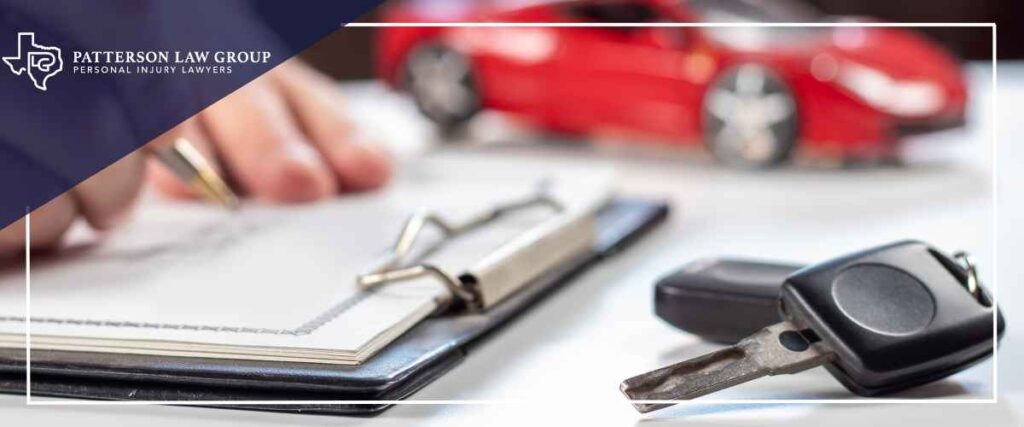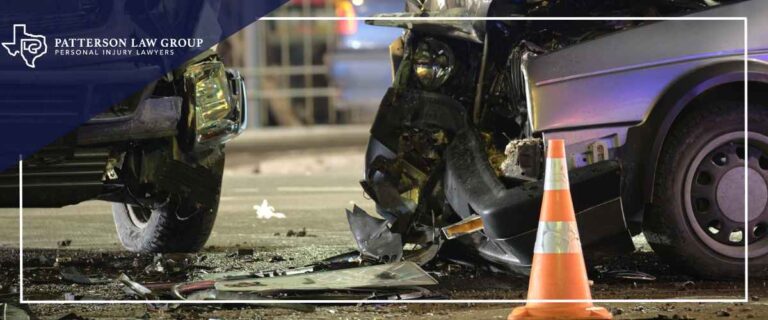Did you know that 20% of Texas drivers are uninsured? Even if you have insurance, do you know if it is enough? A collision with an uninsured driver can result in tens of thousands of dollars in medical bills, lost time at work, and more.
Determining the right amount of auto insurance can be confusing, especially with so many options available. At Patterson Law Group, we’re often asked, “How much insurance do I need?”
To help answer this critical question, it’s essential to understand both the state’s minimum requirements and our professional recommendations for optimal coverage. Being properly insured can significantly mitigate the financial repercussions of an accident. Here, you will find a break down what you need to know to protect yourself and your loved ones on the road.
Understanding Texas Minimum Auto Insurance Requirements
In Texas, there are mandatory insurance coverage minimums for all drivers. All drivers must carry a specific level of liability insurance to cover damages caused to others in an accident. Our Fort Worth injury attorneys emphasize the importance of meeting these minimum standards to avoid legal and financial troubles.
State-Mandated Liability Coverage
Liability insurance in Texas is divided into two main components: bodily injury liability and property damage liability. Both elements are crucial for comprehensive protection and to comply with the law.
Bodily Injury Liability
This portion of your insurance covers medical expenses, lost wages, and other costs associated with injuries you or the policyholder cause to others in an accident. Texas requires a minimum of $30,000 per injured person and $60,000 per accident.
However, a Texas car accident lawyer may highlight that these amounts might not be sufficient given the high costs of medical care today.
Property Damage Liability
Property damage liability covers the expenses of repairing or replacing another person’s property damaged in an accident you caused. The state minimum for this is $25,000, but depending on the accident’s severity, this amount can quickly fall short.
Consequences of Not Meeting Minimum Requirements
Failing to meet the state-mandated liability coverage can lead to severe legal and financial repercussions. Here’s what you need to be aware of:
Legal Penalties
Without the required insurance, you risk facing penalties such as fines, suspension of your driver’s license, and impounding your vehicle. These legal consequences are significant and can complicate your life, making it harder to drive legally in the future.
Financial Risks
Beyond legal penalties, not having the minimum required insurance exposes you to considerable financial risks. In the event of an accident, you would be personally liable for any damages or injuries you cause, which could amount to tens or even hundreds of thousands of dollars.
Seeking advice from an injury attorney in Texas can clarify the financial implications and help you make informed decisions about your coverage levels.
Recommended Additional Coverage Options
While meeting the state-mandated insurance requirements is essential, opting for additional coverage can offer more robust financial protection and peace of mind. At Patterson Law Group, our Fort Worth injury attorneys often advise clients to consider several supplementary options to ensure comprehensive coverage.
Uninsured/Underinsured Motorist Coverage
Uninsured/Underinsured Motorist (UM/UIM) coverage is crucial for Texas drivers, given the high number of uninsured motorists on the road. Many Texas drivers only carry the minimum required liability insurance, which might not be enough to cover substantial damages in a severe accident.
How Much You Should Get
The amount of UM/UIM coverage you should obtain typically depends on several factors, such as the value of your vehicle, your personal financial situation, and the potential medical expenses you might incur.
It’s generally recommended to have UM/UIM coverage equal to your liability coverage limits, which often include:
- Bodily Injury Limits: At least $30,000 per person and $60,000 per accident.
- Property Damage Limits: At least $25,000 per accident.
However, higher limits are advisable for those seeking additional protection from significant financial burdens following an accident. Comprehensive coverage plans offer options upwards of $100,000 per person and $300,000 per accident, ensuring ample coverage for medical expenses and vehicle repairs.
Who It Covers
UM/UIM coverage typically extends to:
- The Policyholder: You are covered whether you drive your car or as a pedestrian.
- Passengers: Any passengers in your vehicle at the time of the accident.
- Family Members: Household relatives can also be covered as passengers or pedestrians.
This broad coverage makes UM/UIM a preferable choice for those who frequently travel with family or friends. It ensures that everyone is protected in the event of an accident involving an underinsured or uninsured driver.
Other Important Information for Texas Drivers
For Texas drivers, understanding UM/UIM coverage is essential:
- Stacking of Coverage: Unlike some states, Texas does not allow the stacking of UM/UIM coverage across multiple policies. This means you cannot combine the limits of various vehicles to increase your coverage.
- Exclusions and Limitations: Be aware of policy exclusions such as limitations in the case of hit-and-run accidents if you cannot identify the other driver.
- Making a Claim: Inform your insurer promptly about an accident involving an uninsured or underinsured driver, and document all medical treatments and repairs for a smoother claims process.
- Waiver Requirements: Texas law requires you to sign a waiver if you opt not to purchase UM/UIM coverage. Evaluating the pros and cons carefully with your insurance advisor is strongly recommended.
By thoroughly understanding and choosing appropriate UM/UIM coverage limits, Texas drivers can better safeguard themselves and their loved ones against significant financial setbacks from accidents involving uninsured or underinsured motorists.
Personal Injury Protection (PIP)
Personal Injury Protection (PIP) is an essential component of auto insurance that covers medical expenses, lost wages, and other injury-related costs, regardless of who is at fault for the accident. In Texas, PIP coverage is mandatory unless you explicitly reject it in writing.
How Much You Should Get
The amount of PIP coverage you should select depends on various factors, such as your health insurance coverage, your financial situation, and the potential income you might lose during recovery from an accident. Texas law requires insurers to offer a minimum of $2,500 in PIP coverage per person, but purchasing higher limits for better protection is often recommended.
- Minimum Coverage: $2,500 per person.
- Recommended Coverage: Many experts suggest opting for $10,000 or more, as medical costs and lost income can quickly increase after an accident.
Higher limits can provide additional peace of mind and financial security, ensuring you won’t face significant out-of-pocket expenses during your recovery.
Who It Covers
PIP coverage extends to various individuals involved in an accident, including:
- The Policyholder: You are covered for medical bills, lost wages, and other related expenses.
- Passengers: Any passengers in your vehicle during the accident are covered.
- Family Members: Household relatives can also receive PIP benefits if injured while riding in your vehicle or as pedestrians.
This extensive coverage ensures that PIP can substantially support you and your loved ones in the aftermath of an accident, irrespective of fault.
Other Important Information for Texas Drivers
For Texas drivers, understanding the specifics of PIP coverage is crucial:
- Medical and Non-Medical Expenses: PIP covers medical bills and reimburses for non-medical expenses such as lost income and essential services like childcare or house cleaning if you cannot perform these tasks due to your injuries.
- No-Fault Insurance: PIP is considered “no-fault” insurance, meaning benefits are paid regardless of who caused the accident. This ensures prompt payment of claims to cover immediate needs.
- Prompt Filing: Timely filing is crucial. Inform your insurer as soon as possible following an accident, and keep detailed records of all related expenses for a smoother claims process.
- Rejection of PIP: Texas law requires a signed rejection form if you choose not to include PIP in your insurance policy. Careful consideration and consultation with your insurance advisor are advised before making this decision.
Texas drivers can significantly mitigate the financial strain associated with injuries and recovery after an accident by understanding and appropriately selecting your PIP coverage limits.
Collision and Comprehensive Coverage
Collision and Comprehensive Coverage are critical components of an auto insurance policy, offering protection for your vehicle in a variety of situations beyond just accidents with other vehicles.
How Much You Should Get
Determining the appropriate amount of Collision and Comprehensive Coverage depends on factors such as your vehicle’s value, your financial situation, and your ability to pay for repairs or replacement out of pocket. Most policies offer a range of deductible options, typically between $250 and $1,000.
- Deductible Options: The deductible is the amount you pay out of pocket before your insurance coverage kicks in. Lower deductibles will increase your premium but reduce out-of-pocket costs in the event of a claim.
- Recommended Deductible: Many experts recommend selecting a deductible that aligns with your financial capacity to cover unexpected expenses while balancing the cost of monthly premiums.
Selecting the right deductible is key to balancing affordable premiums and manageable out-of-pocket costs.
Who It Covers
Collision and Comprehensive Coverage specifically extend to the vehicle listed on the policy, including:
- The Policyholder: Coverage applies to your vehicle, whether you or a permitted driver is operating it.
- Permitted Drivers: This coverage also benefits individuals listed on your policy as authorized drivers when they drive your vehicle.
This coverage ensures that your vehicle-related expenses are covered no matter who drives the insured car.
Other Important Information for Texas Drivers
For Texas drivers, it’s essential to understand the unique benefits and stipulations of Collision and Comprehensive Coverage:
- Collision Coverage: This covers damages to your vehicle resulting from a collision with another vehicle or object, irrespective of who caused the accident.
- Comprehensive Coverage: This extends to non-collision-related damages, such as those resulting from theft, vandalism, natural disasters, fire, or animal strikes. It’s a more inclusive option that covers a broader range of potential incidents.
- Gap Insurance Consideration: If you have a loan or lease on your vehicle, consider purchasing gap insurance. This covers the difference between your car’s actual cash value and the amount still owed on the loan or lease, ensuring you are not left with a financial shortfall in the event of total loss.
- Prompt Reporting: Reporting accidents and damages to your insurer can expedite the claims process. Keep detailed records and evidence of all incidents to facilitate smoother and quicker settlements.
- Adjusting Coverage: As your vehicle ages, its value decreases, so you might consider adjusting your Collision and Comprehensive Coverage deductibles and limits accordingly. You should also regularly review your policy to ensure it continues to meet your needs effectively.
By understanding and selecting appropriate Collision and Comprehensive Coverage limits, Texas drivers can safeguard themselves against significant financial losses due to various types of vehicular damage. Our Fort Worth accident lawyers are available to provide personalized advice to help you choose the coverage that best suits your needs.
Non-Collision Damage (e.g., Theft, Natural Disasters)
Comprehensive coverage covers damage from non-collision incidents such as theft, vandalism, or natural disasters like hailstorms or floods. A car accident lawyer in Fort Worth would likely recommend this option, especially if you reside in areas prone to such risks.
Roadside Assistance and Rental Reimbursement
Adding roadside assistance and rental reimbursement to your auto insurance policy can be incredibly practical.
Unexpected Breakdowns and Towing
Roadside assistance provides towing, flat tire changes, and battery jump-starts. This extra layer of coverage ensures you’re not stranded or facing unexpected expenses due to vehicle breakdowns.
Rental Car Coverage
Rental reimbursement helps cover the cost of renting a car while yours is being repaired after an accident. This can be extremely convenient, allowing you to maintain your daily routine without significant disruption.
Incorporating these additional coverage options can make a substantial difference in your overall financial protection and peace of mind. Our car accident lawyers in Fort Worth are dedicated to guiding you through these decisions, ensuring you have the best possible coverage for your unique needs.
Texas Insurance Requirements At a Glance
| Coverage Type | Description | State Requirements |
| Bodily Injury Liability | Covers medical costs, rehabilitation, and legal fees | $30,000 per person and $60,000 per accident |
| Property Damage Liability | Covers the repair or replacement of property | $25,000 limit |
| Uninsured Motorist | Offers bodily injury and property damage coverage | Not required |
| Underinsured Motorist | Offers protection in an accident with someone who does not have sufficient coverage | Not required |
| Personal Injury Protection | Protects in an accident with someone who does not have enough coverage | Not required (must be offered by insurer) |
| Collision | Covers the cost of repairing or replacing your vehicle | Not required |
| Comprehensive | Covers the cost to repair or replace your vehicle if damaged in an event other than a collision | Not required |
Factors to Consider When Choosing Your Coverage
Selecting the right auto insurance coverage involves evaluating several key factors tailored to your individual circumstances. Understanding these elements can help you make informed decisions that balance cost with comprehensive protection.
-
- Driving Habits: Your driving habits play a significant role in determining the type and level of coverage you need.
- Frequency and Distance of Travel: If you frequently drive long distances or spend considerable time on the road, opting for more extensive coverage can provide added security. Higher exposure to potential accidents or incidents necessitates comprehensive protection.
- Type of Vehicle: Your vehicle’s make, model, and age can impact your insurance needs. Newer or high-value vehicles may benefit from collision and comprehensive coverage to protect against costly repairs or replacements. Conversely, older vehicles might require less coverage.
- Financial Stability: Your financial situation influences how much risk you can comfortably assume.
- Asset Protection: For individuals with significant assets, higher liability limits and additional coverages can protect against potential financial losses in the event of a significant accident.
- Loan/Lease Requirements: If your vehicle is financed or leased, your lender or leasing company may require you to carry certain coverages, such as collision and comprehensive insurance.
-
- Personal Risk Tolerance: Your comfort level with risk and potential out-of-pocket expenses will guide your coverage choices.
- Comfort with Out-of-Pocket Expenses: Assess how much you can pay out of pocket if an accident occurs. Higher deductibles can lower your premium but result in more substantial expenses when filing a claim.
- Desired Level of Peace of Mind: Ultimately, the peace of mind you seek from your auto insurance will influence your coverage decisions. Some drivers prefer maximum coverage for the highest level of security, while others may opt for only the essentials to meet financial and legal requirements.
Considering these factors when choosing your auto insurance coverage can help you create a policy that fits your unique needs and circumstances. Our car accident lawyers in Fort Worth can provide personalized advice to ensure your coverage offers the protection you deserve.
The Path to Optimal Auto Insurance Coverage
Navigating the complexities of auto insurance coverage requires a thorough understanding of various factors, from driving habits and vehicle type to financial stability and personal risk tolerance.
By evaluating these elements, you can tailor a policy that meets legal requirements and provides a level of protection that aligns with your individual needs and peace of mind.
Our experienced car accident lawyers in Fort Worth are here to assist you in making these crucial decisions, ensuring you achieve optimal auto insurance coverage that safeguards your financial future and offers comprehensive protection on and off the road.
Contact our Fort Worth injury attorneys if you are involved in an accident and need assistance. We offer free consultations for all clients.






